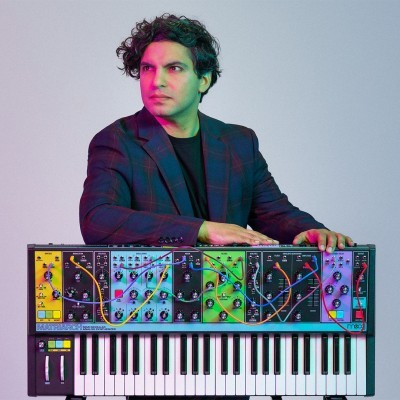Zubin Kanga
Zubin Kanga is a pianist, composer, and technologist. For over a decade, he has been at the forefront of curating and creating interdisciplinary musical programmes that seek to explore and redefine what it means to be a performer through interactions with new technologies.
In 2020, following his appointment as Lecturer in Musical Performance and Digital Arts at Royal Holloway, University of London, Kanga was awarded a £1.4 million UK Research and Innovation Future Leaders Fellowship to fund his latest multi-year project, Cyborg Soloists, which is unlocking new possibilities in composition and performance through interactions with AI and machine learning, interactive visuals and VR, motion and biosensors, and new hybrid instruments. His Cyborg Soloists research has been featured in The New York Times, The Wire, Classical Music Magazine, and Limelight Magazine.
Zubin has premiered more than 150 works and performed at many international festivals including the BBC Proms, Huddersfield Contemporary Music Festival, London Contemporary Music Festival (UK), Melbourne Festival (Australia), Festival Présences, Paris Autumn Festival (France), Time of Music (Finland), Klang Festival (Denmark), PODIUM Festival (Germany), and Gaudeamus Festival (Netherlands).
As a composer, Kanga’s output includes Dead Leaves for piano and live electronics, which was selected to represent Australia at the International Rostrum of Composers in 2018; Spider Web Castle for viola and piano, which he premiered with Brett Dean at Extended Play Festival; and Steel on Bone, which he premiered at hcmf//, featuring MiMU multi-sensor gloves morphing the sounds of extended techniques inside the piano, which The Times praised for its ‘bravura and madness’.
Recent collaborations include Philip Venables’ Answer Machine Tape, 1987, which explores the AIDS crisis through a crucial week in the life of New York artist David Wojnarowicz, using a KeyScanner to allow the piano to type text onto the screen like a typewriter; Neil Luck’s Whatever Weighs You Down, using MiMU sensor gloves to interact with Deaf performance artist Chisato Minamimura; and Alexander Schubert’s internet-based score WIKI-PIANO.NET (performed 30 times across nine countries as well as the BBC World Service) as well as a new collaboration with Schubert, Steady State, that will use EEG brain sensors to control sound and light.
Zubin Kanga is a pianist, composer, and technologist. For over a decade, he has been at the forefront of curating and creating interdisciplinary musical programmes that seek to explore and redefine what it means to be a performer through interactions with new technologies.
In 2020, following his appointment as Lecturer in Musical Performance and Digital Arts at Royal Holloway, University of London, Kanga was awarded a £1.4 million UK Research and Innovation Future Leaders Fellowship to fund his latest multi-year project, Cyborg Soloists, which is unlocking new possibilities in composition and performance through interactions with AI and machine learning, interactive visuals and VR, motion and biosensors, and new hybrid instruments. His Cyborg Soloists research has been featured in The New York Times, The Wire, Classical Music Magazine, and Limelight Magazine.
Zubin has premiered more than 150 works and performed at many international festivals including the BBC Proms, Huddersfield Contemporary Music Festival, London Contemporary Music Festival (UK), Melbourne Festival (Australia), Festival Présences, Paris Autumn Festival (France), Time of Music (Finland), Klang Festival (Denmark), PODIUM Festival (Germany), and Gaudeamus Festival (Netherlands).
As a composer, Kanga’s output includes Dead Leaves for piano and live electronics, which was selected to represent Australia at the International Rostrum of Composers in 2018; Spider Web Castle for viola and piano, which he premiered with Brett Dean at Extended Play Festival; and Steel on Bone, which he premiered at hcmf//, featuring MiMU multi-sensor gloves morphing the sounds of extended techniques inside the piano, which The Times praised for its ‘bravura and madness’.
Recent collaborations include Philip Venables’ Answer Machine Tape, 1987, which explores the AIDS crisis through a crucial week in the life of New York artist David Wojnarowicz, using a KeyScanner to allow the piano to type text onto the screen like a typewriter; Neil Luck’s Whatever Weighs You Down, using MiMU sensor gloves to interact with Deaf performance artist Chisato Minamimura; and Alexander Schubert’s internet-based score WIKI-PIANO.NET (performed 30 times across nine countries as well as the BBC World Service) as well as a new collaboration with Schubert, Steady State, that will use EEG brain sensors to control sound and light.
External Links
Music Map
Discover more about the classical music of today with NMC's Music Map, and exciting and educational online tool which enables you to see and hear the connections between composers, their teachers, pupils, influences and their works.
Music Map
